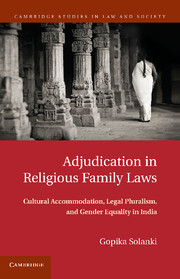 Adjudication in Religious Family Laws
Adjudication in Religious Family Laws Book contents
- Frontmatter
- Contents
- List of Figures
- List of Tables
- Preface
- Acknowledgments
- Abbreviations
- Glossary
- 1 Introduction
- 2 The Shared Adjudication Model
- 3 State Law and the Adjudication Process
- 4 Making and Unmaking the Conjugal Family
- 5 Juristic Diversity, Contestations over “Islamic Law,” and Women's Rights
- 6 Conclusion
- Appendix
- Bibliography
- Index
- CAMBRIDGE STUDIES IN LAW AND SOCIETY
2 - The Shared Adjudication Model
Theoretical Framework and Arguments
Published online by Cambridge University Press: 03 May 2011
- Frontmatter
- Contents
- List of Figures
- List of Tables
- Preface
- Acknowledgments
- Abbreviations
- Glossary
- 1 Introduction
- 2 The Shared Adjudication Model
- 3 State Law and the Adjudication Process
- 4 Making and Unmaking the Conjugal Family
- 5 Juristic Diversity, Contestations over “Islamic Law,” and Women's Rights
- 6 Conclusion
- Appendix
- Bibliography
- Index
- CAMBRIDGE STUDIES IN LAW AND SOCIETY
Summary
Introduction
In this chapter, I discuss the shared adjudication model; that is, the manner in which the Indian state shares adjudicative power with religious/societal bodies and actors in the regulation of marriage and divorce among Hindus and Muslims. This model produces justice that is multilocational, and each adjudicative site – formal or informal – provides a forum for interaction between state and societal laws and legal actors. I trace the nature of state-society relations at the interface of personal laws in diverse state and nonstate legal forums, and assess their impact on cultural accommodation and gender equality in Hindu and Muslim personal laws.
This chapter is divided into three sections. The first section classifies state and nonstate societal legal organizations and agents. The second section focuses on state-society relations in interpenetrative official and unofficial legal forums. I argue that state and nonstate actors engage in conflict, cooperation, negotiations, and communication over the content of laws governing marriage and divorce in multiple adjudicative locales. As a result, the statist version of the conjugal family and the notions of rights and obligations in marriage and divorce are destabilized, transformed, adapted, or unmade in a variety of legal settings. The third section discusses how postcolonial states might balance religious groups' demands for autonomy in the governance of the conjugal family and ensure gender equality.
- Type
- Chapter
- Information
- Adjudication in Religious Family LawsCultural Accommodation, Legal Pluralism, and Gender Equality in India, pp. 41 - 90Publisher: Cambridge University PressPrint publication year: 2011
